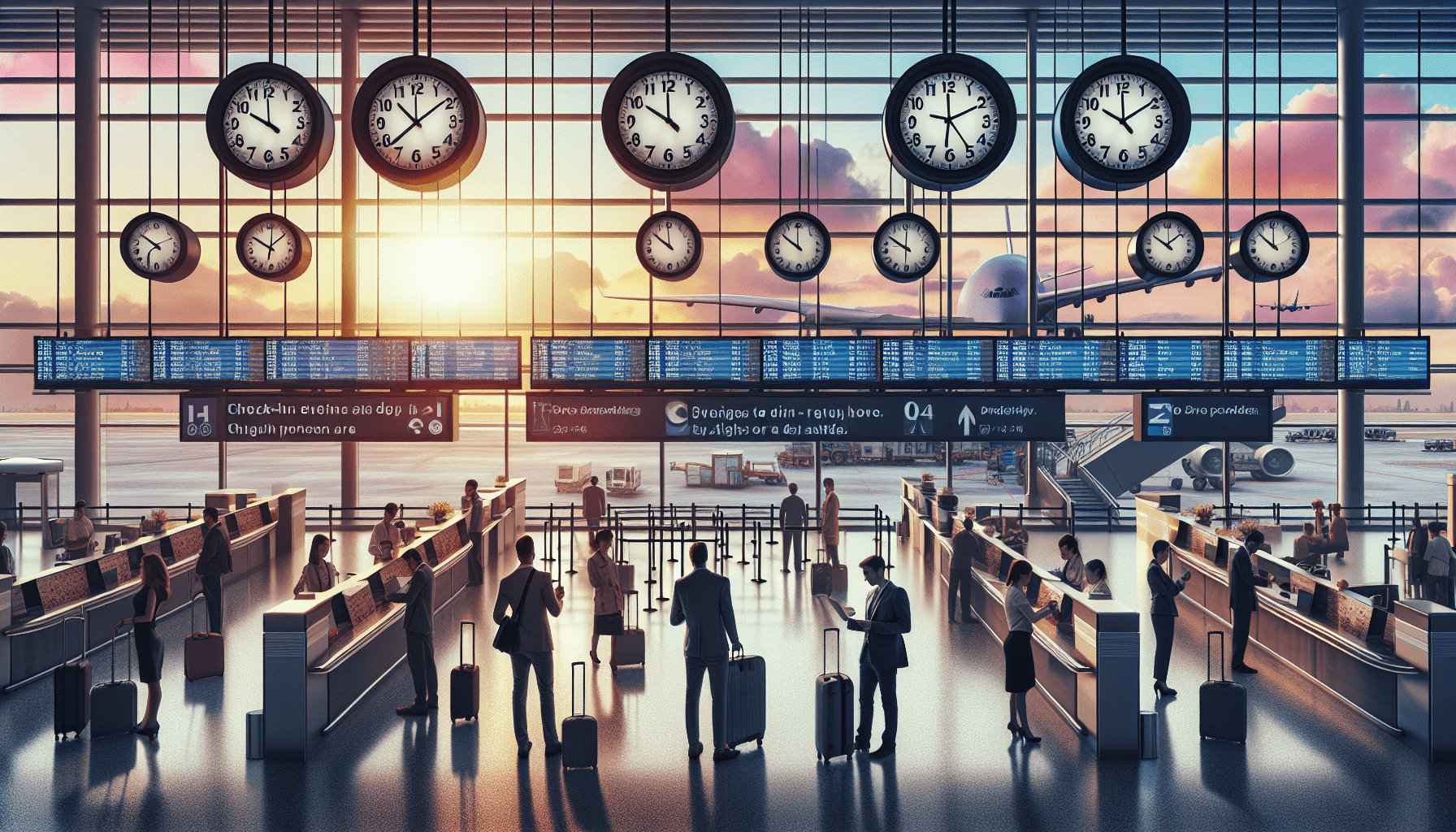18pack Travel Bottles for Toiletries,TSA Approved Silicone Travel size Containers for Toiletries,Leak Proof Refillable Liqus Shampoo And Conditioner Travel Essentials toiletry Bottles
$9.99 (as of April 6, 2025 11:38 GMT +00:00 - More info)When it comes to air travel, there’s nothing more frustrating than experiencing a flight delay. However, according to experts, you can lower your chances of facing those annoying delays by being strategic about the time of day you choose to fly. Afternoon and evening flights tend to be more prone to delays, with disruptions in earlier flights and bad weather being major factors. On the other hand, morning flights offer the highest rate of punctuality, as planes are ready to go and there’s less risk of crew shortages. So the next time you’re planning your trip, consider booking that early morning flight to avoid the frustration of waiting around for a delayed departure.

Shop These Accessories for a Comfortable Trip
Afternoon Flights
When it comes to flight delays, the afternoon is a prime time for disruptions. This is because many afternoon flights require planes to fly in from elsewhere. If the flight bringing in the plane gets disrupted or delayed, it can have a cascading effect on subsequent flights. This means that if you book an afternoon flight, there is a higher risk of experiencing delays.
Additionally, storms are more likely to occur in the afternoon compared to other times of the day. This is due to a rise in air temperature and humidity, which creates the perfect conditions for thunderstorms. If you book an afternoon flight, you may find yourself waiting for hours for bad weather to pass. To avoid this inconvenience, it is advisable to consider booking your flight for an earlier time.
Evening Flights
If you want to lower your chances of experiencing a flight delay, it’s best to avoid booking an evening flight. According to the Department of Transportation report, delays are most likely to occur in the evening. The worst flight time to book is between 8 p.m. and 8:59 p.m., where only 79% of flights leave within 15 minutes of their scheduled departure time.
A separate study by The Points Guy found that the pattern of delays extends to arrival times as well. Between 8 p.m. and 10:59 p.m., 27% of flights were at least 15 minutes late, more than any other period throughout the day. Therefore, if you want to minimize the chances of a delay, it is best to avoid booking an evening flight.
However, it is worth noting that late-night flights have a lower likelihood of running late. The Department of Transportation report states that flights beginning between 11 p.m. and 11:59 p.m. departed on schedule nearly 89% of the time. If you’re willing to stay up a bit later, booking a late-night flight may be a good option to avoid the inconvenience of delays.
Shop These Accessories for a Comfortable Trip
Late-Night Flights
Late-night flights are known for having less likelihood of delays compared to other time slots. The Department of Transportation report indicates that flights between 11 p.m. and 11:59 p.m. tend to leave on schedule nearly 89% of the time. This can be attributed to several factors.
One advantage of booking late-night flights is that the planes have been sitting at the airport overnight. This means they are fully prepared to take off as soon as it’s time to board. Unlike flights later in the day, which may face delays due to cascading effects from earlier disruptions, late-night flights have a higher chance of departing on time.
Another advantage of late-night flights is the potential for shorter wait times at the airport. Since most people prefer to travel during the day, late-night flights tend to have fewer passengers. This can lead to smoother check-in and security processes, allowing for a more seamless travel experience.
Morning Flights
If you want to minimize the chances of experiencing a flight delay, morning flights are your best bet. The Department of Transportation report found that flights departing between 6 a.m. and 6:59 a.m. have the highest punctuality rate, with 93.5% of flights departing on time.
There are several reasons why morning flights tend to be more punctual. First, planes scheduled to fly in the morning have been sitting at the airport overnight, meaning they are ready to go once it’s time to board. This eliminates the need for additional preparation time, reducing the likelihood of delays.
Secondly, as the day progresses, flight delays can have a cascading effect. This is due to regulations that limit the number of hours pilots and flight attendants can work. If a morning flight faces any issues and ends up using more hours than planned, the crew may have to skip their next scheduled flight to comply with regulations. This can result in delays for subsequent flights.
Therefore, if punctuality is a priority for you, consider booking a morning flight. Not only are they more likely to depart on time, but you may also experience shorter wait times at the airport as there are typically fewer passengers during these hours.

Overcoming Staff Shortages
Staff shortages can have a significant impact on flight delays. There are several causes of staff shortages in the aviation industry, including sick leave, scheduling conflicts, and unexpected events. When airlines do not have enough staff members available, they may need to cancel or delay flights.
The impact of staff shortages on flight delays is quite significant. Without enough pilots or flight attendants, airlines cannot operate flights as scheduled. This can result in delays, cancellations, or the need to find replacement staff members at the last minute. Passengers may end up waiting at the gate until the airline resolves the staff shortage issue.
For passengers, staff shortages can cause inconvenience, frustration, and potential disruptions to their travel plans. It is essential for airlines to have contingency plans in place to address staff shortages effectively and minimize the impact on passengers. However, it’s important to note that staff shortages are often beyond the control of airlines, and delays caused by these factors are sometimes unavoidable.
Considerations for Travel Planning
When planning your travel, there are several factors to consider that can help you lower the chances of experiencing flight delays. These considerations can ensure a smoother and more efficient travel experience.
First, it is essential to take into account the time of day you choose to fly. As mentioned earlier, morning flights tend to be the least likely to experience delays, while afternoon and evening flights have a higher risk of disruptions. By scheduling your flight for a time when delays are less common, you can reduce the chances of encountering inconvenience.
Flexibility is another important factor to keep in mind. Having some flexibility in your travel plans allows you to adjust to any unexpected delays or changes. This could mean being open to alternative flight times or even considering a different day for your travel. By maintaining some flexibility, you can adapt to unforeseen circumstances and minimize the impact of delays on your travel experience.
Choosing the best time to fly based on your individual needs is crucial. Consider factors such as your specific destination, the purpose of your trip, and any time constraints you may have. By taking into account these factors, you can make an informed decision that balances your priorities and minimizes the potential for delays.
Utilizing Flight Delay Data
For travelers looking to make informed decisions about their flights, accessing flight delay data can be invaluable. There are several resources available that provide information on past flight delays, including official government websites, airline websites, and third-party apps.
When utilizing flight delay data, it’s important to understand how to interpret and use the information effectively. Look for patterns and trends in delays for specific routes or airports. Pay attention to the time of day and time of year when delays are more likely to occur. This can help you make educated decisions when planning your travel.
By analyzing flight delay data, you can tailor your travel plans to minimize the chances of experiencing disruptions. For example, if a particular route or airline consistently experiences delays during certain times, you may choose to avoid booking flights within that timeframe. Being aware of potential delays can empower you to make the best choices for your travel needs.
Other Factors Affecting Flight Delays
While the time of day is an essential consideration when it comes to flight delays, there are other factors that can also contribute to disruptions in flight schedules. Weather conditions play a significant role in flight delays, with storms, fog, and extreme weather events often leading to cancellations or delays.
Air traffic congestion is another factor that can cause delays. Busy airports and crowded airspace can result in longer taxiing times, increased waiting for takeoff or landing slots, and overall disruptions to flight schedules.
Maintenance and technical issues can also contribute to flight delays. Airlines prioritize safety, and if a plane requires maintenance or repairs, it may cause delays or even result in the cancellation of a flight. These issues are often out of the airlines’ control and are necessary to ensure the safety and well-being of passengers.
Understanding these factors and the potential impact they can have on flight schedules can help you prepare for any potential delays or disruptions. By being aware of these possibilities, you can plan accordingly and minimize the inconvenience of unexpected changes to your travel plans.
Alternatives to Air Travel
In certain situations, it may be worth considering alternative modes of transportation to avoid potential flight delays. Depending on your specific destination and circumstances, other options such as trains, buses, or even driving may provide a more reliable and efficient travel experience.
When considering alternative modes of transportation, it’s important to compare the travel options based on factors such as time, convenience, and cost. While flights may offer speed and long-distance travel capabilities, other modes of transportation can provide different advantages, such as scenic routes, flexible schedules, and ease of access to specific locations.
Balancing the cost and potential delays of air travel with the advantages of alternative modes of transportation can help you make the best decision for your specific travel needs. It’s important to weigh the pros and cons of each option and choose the option that aligns with your priorities and preferences.
Tips for Dealing with Flight Delays
While it’s impossible to completely eliminate the risk of flight delays, there are strategies you can employ to minimize the impact of delays on your travel plans. Here are a few tips for dealing with flight delays:
-
Prepare for potential delays: Pack essential items such as snacks, entertainment, and chargers in your carry-on bag to help you stay comfortable during a delay.
-
Stay informed: Keep an eye on flight status updates provided by the airline. Be proactive in checking for any changes or delays to your flight.
-
Stay in touch with the airline: If you experience a delay, reach out to the airline’s customer service for assistance. They may be able to provide alternative options or accommodations.
-
Have a backup plan: Consider having a backup itinerary in case of a significant delay or cancellation. This could involve booking a hotel near the airport or exploring alternative transportation options.
-
Know your rights: Familiarize yourself with passenger rights and compensation policies. In certain cases, you may be entitled to compensation or assistance from the airline due to a delay.
By being prepared, staying informed, and understanding your options, you can navigate flight delays with greater ease and minimize the impact on your travel experience. Remember to stay calm and adaptable, as delays are sometimes unavoidable and out of your control.
In conclusion, when it comes to flight delays, the time of day you choose to fly can have a significant impact on your travel experience. By avoiding afternoon and evening flights, you can lower the chances of encountering delays. Morning flights tend to be the most punctual, while late-night flights have a lower likelihood of delays. Understanding the potential causes of delays, considering alternative modes of transportation, and employing strategies for dealing with delays can help you navigate any disruptions smoothly. By planning strategically and being informed, you can increase the likelihood of a seamless and enjoyable travel experience.
Shop These Accessories for a Comfortable Trip






